Before you dig deep into this comparison, I want you to pay closer attention to the starring roles picture. You had to look twice, didn’t you? Well, today’s comparison stars are two extraordinary air purifiers that are more than a look alike.
Philips Series 800 and Levoit Core 300 are two big competitors whose strengths deserve a detailed review.
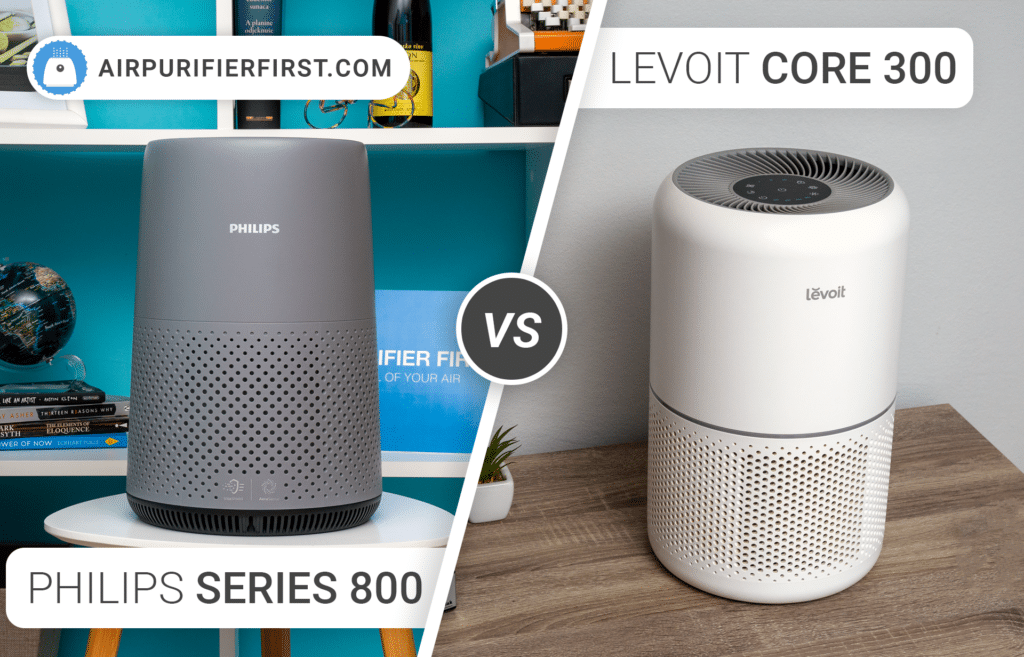
Table of Contents
First, and most of all, we are talking about two top devices that are very affordable and, most importantly, very reliable.
As I said at the beginning, these two air purifiers look almost identical in their cylindrical shape. They both have filters placed at the bottom part, while on the upper part, they have motors and control buttons. Honestly, I like the build quality of the Philips much more, although I can say that both are of okay quality. You can find both appliances in black or white versions.
Philips Series 800 covers rooms up to 176 sq. ft., while the Levoit Core 300 covers slightly larger rooms up to 219 sq. ft. The Philips Series 800 has several different models, but the one I tested uses 3-stage filtration technology, the same as the Levoit Core 300. The only significant difference when it comes to filtration technology is that Philips does not use a True HEPA filter.
Follow me in today’s detailed comparison and find out which air purifier gets to ‘’walk away’’ as a winner.
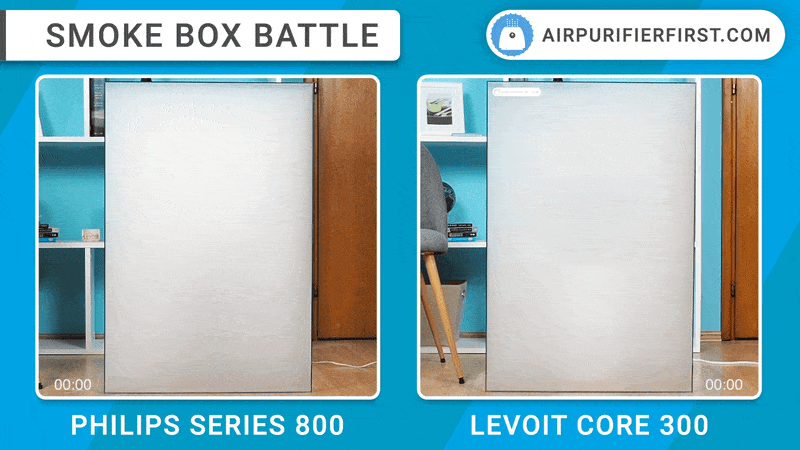
- Philips Series 800 – A compact air purifier intended for rooms of up to 176 sq. ft. It uses a three-stage filtration technology, including a pre-filter, a NanoProtect HEPA filter, and an activated carbon filter. It has an air quality sensor and auto mode features, but it lacks a True HEPA filter.
- Levoit Core 300 – A portable air purifier suitable for rooms up to 219 sq. ft. Unlike the Philips, the Core 300 lacks an air quality sensor and auto mode. It has a three-stage filtration system comprising a pre-filter, a True HEPA filter, and an activated carbon filter.
*If you click any of these links and make a purchase, we earn a commission at no additional cost to you.
Specs: Philips Series 800 Vs Levoit Core 300
| Product Image | 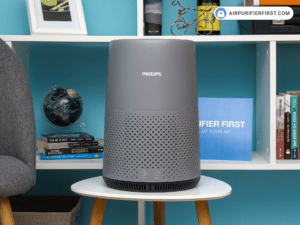 | 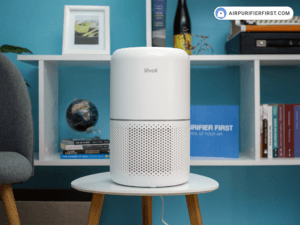 |
| Manufacturer | Philips | Levoit |
| Model | Series 800 | Core 300 |
| Dimensions (inches / cm) | 14.4 x 9.8 x 9.8 inches (36.7 x 25 x 25 cm) | 8.7 x 8.7 x 14.2 inches (22 x 22 x 36 cm) |
| Weight (pounds / kg) | 5.3 lb (2.4 kg) | 7.5 lb (3.4kg) |
| Clean Air Delivery Rate (CADR) | 112 CFM (190 m³/h) | 141 CFM (240 m³/h) |
| Coverage (4.8 ACH)
Room Coverage Explanation: ACH is a measurement used in indoor air quality management to indicate how many times the air within a defined space is changed/moved through the filter media.
For more details, visit our ACH calculator tool. | 176 sq. ft. (16 m²) | 219 sq. ft. (20 m²) |
| Performance Ratings Performance Ratings Score Summary: 8.6 - Average Score (67 products) 9.8 - Best Score (2 products) 2.5 - Worst Score (1 products) We use the Temtop LKC-1000S laser particle meter to test the particle removal efficiency of every air purifier. It measures PM2.5 (µg/m3), PM10 (µg/m3), Particles (per/L), and HCHO (mg/m3) in the air, and also calculates the AQI. You can read more about our testing methodology here. | ||
| Filtration Technology | Pre-filter, NanoProtect HEPA Filter, and Activated Carbon Filter | Pre-filter, True HEPA Filter, and Activated Carbon Filter |
| Filter Replacement Indicator | Yes | Yes |
| Filter Life | up to 12 months | 6-8 months |
| Power Consumption
Power Usage Summary: Our extensive testing of 67 air purifiers revealed the following power consumption insights:
Check out our power consumption calculator tool. | 20W | 45W |
| Operating Costs Ratings Operating Costs Ratings Score Summary: 9.1 - Average Score (67 products) 10 - Best Score (2 products) 8 - Worst Score (1 products) We measure the power usage at all speeds using an energy meter, after which we calculate how much it would cost to use the device at a particular fan speed for one month. For reference, we use an energy price of $0.12 per kWh. You can read more about our testing methodology here. | ||
| Number of Fan Speeds | 3 – Sleep Mode, Auto Mode, and Turbo Mode | 4 – Sleep Mode, Speed 1, Speed 2, and Speed 3 |
| Air Quality Sensor Air Quality Sensor Summary: Out of 67 air purifiers tested, only 31 have the air quality sensor. | Yes | No |
| Air Quality Indicator | Yes | No |
| Auto Mode Auto Mode Summary: Out of 67 air purifiers tested, only 32 have auto mode functionality. | Yes | No |
| Smart App Smart App Summary: Out of 67 air purifiers tested, only 20 have smart app functionality. | No | No |
| Voice Control Voice Control Summary: Out of 67 air purifiers tested, only 20 have voice control functionality. | No | No |
| Other Features | N/A | Display LockDisplay OffTimer |
| Noise Level (low – high) | 41.8 – 62.8 dBA | 40.7 – 64.9 dBA |
| Noise Ratings Noise Ratings Score Summary: 9.3 - Average Score (67 products) 10 - Best Score (1 products) 8.2 - Worst Score (1 products) We use a special noise measurement tool to test the noise level of the air purifier at all speeds. We measured the noise level on the dBA scale. You can read more about our testing methodology here. | ||
| Best Suited For | Bedrooms Allergies Low Energy Cost Small Spaces | Bedrooms Small Spaces Dust Allergies Children's Rooms |
| Warranty | 2-year | 2-year |
| In-Depth Review | Philips Series 800 | Levoit Core 300 |
| Price | Check Price on Amazon | Check Price on Amazon |
Philips Vs Levoit Features
Even though both Philips and Levoit air purifiers don’t come equipped with many advanced options, the existing ones are more than enough to make each air purifier fulfill all your needs.
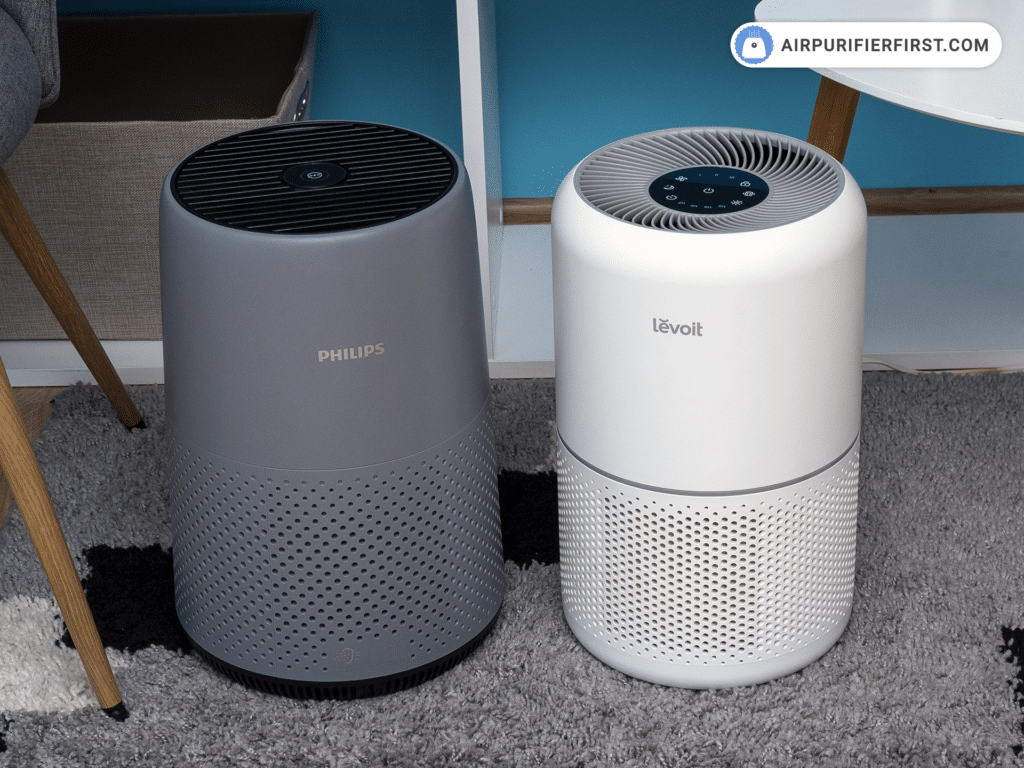
Going through features could make you think how opposite these two air purifiers are, but the fact is both air purifiers are quite good in what they are assigned to.
Air Quality Sensor and Air Quality Indicator
To have this feature as a comparative advantage is a privilege for the Philips Series 800 air purifier. Levoit Core 300 does not have this option available.
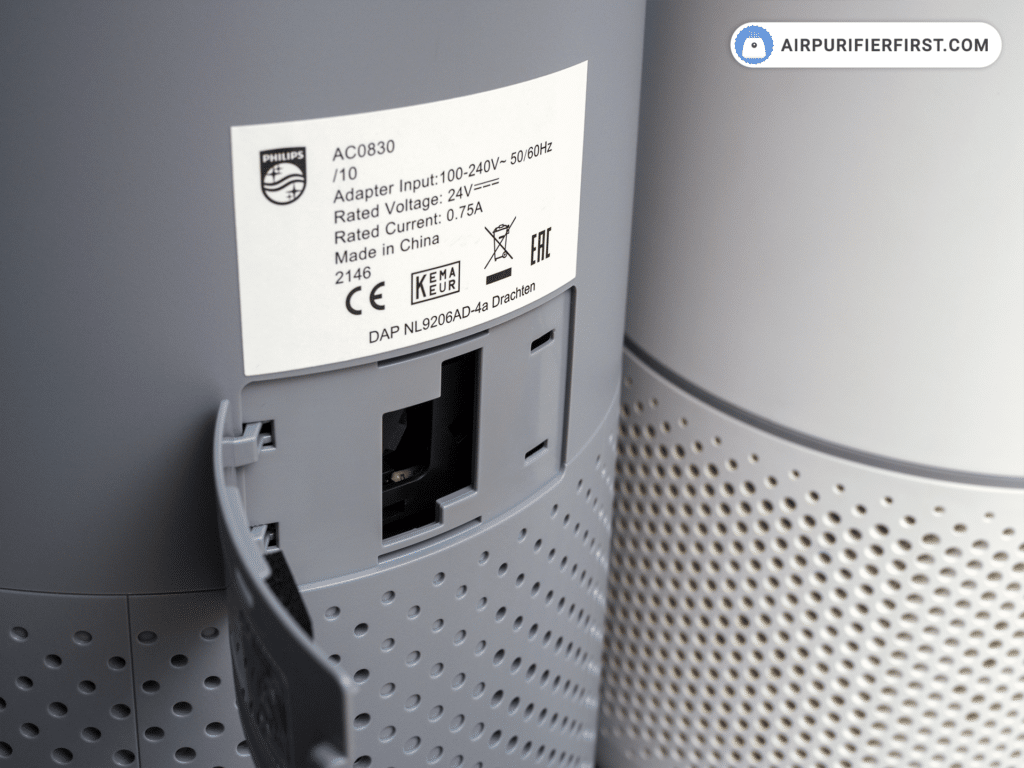
We all know what the air quality sensor and the indicator are for, but in the case of the Philips air purifier, the air quality sensor can detect PM 2.5 particles in real-time. Along with the air quality indicator, it gives you true and constant information on the air that circles around your working or living area.
Different colors of the Indicator tell you how polluted or clean the air is.
Auto Mode
Having an auto mode is like a holy trinity along with the air quality sensor and air quality indicator, and in this case, Philips air purifiers get to own it. Once you turn this option ON, it will automatically switch between operating modes and fan speeds, depending on the necessity. By necessity, I mean real-time air quality. It’s like having a Smart little helper around the house.
Sleep Mode
Both air purifiers, Philips and Levoit, have sleep mode. One of the differences is that this mode is one of three fan speeds at Philips Series 800, while with Levoit Core 300, it comes as an extra option.
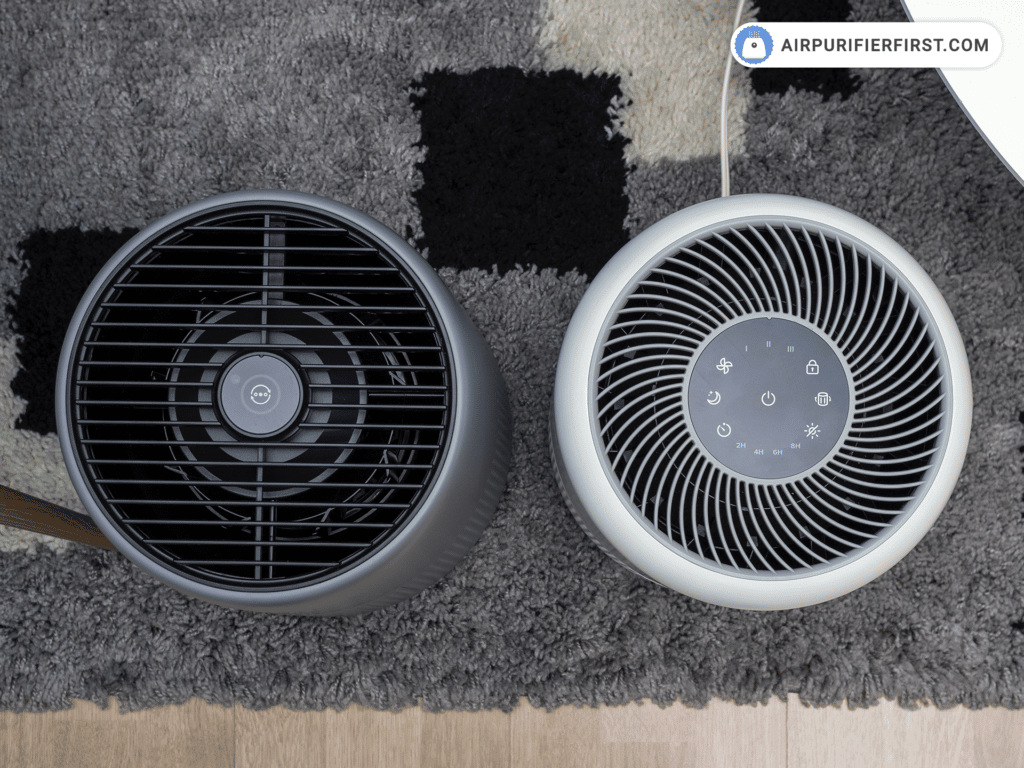
In each case, if you set the air purifier to sleep mode, you will be surprised to see how camouflaged an appliance can be. Being extremely quiet is what makes Philips and Levoit air purifiers ideal for your bedroom, especially at night.
Timer
There is another fun feature that Levoit has while Philips does not. It’s the Timer, which you can set to 2h, 4h, 6h, or 8h. When combined with the Sleep mode, you can easily get cost/benefit control over the appliance.
Display lock and Display Off
Having these features is kind of an extra added value to the Levoit Core 300 air purifier since both options are available only on this device. The display off feature means not a single ray of light will be interrupting your sleep once you press this button. It actually eliminates that tiny miny ray of light that comes out when the device is in Sleep mode.
On the other hand, a display lock is a safety measure that protects your air purifier from unsafe usage. A 3-second long button press is all it takes to (de)activate this option.
Filter Reset Indicator
One of the most useful features is the filter reset Indicator, which keeps track of filter replacement time. For example, if you buy Philips Series 800, it will take about a year before you need to replace the filter. It’s a long period for you to keep track of, and the filter reset Indicator will notify you with a red light when it’s time to do the replacement.
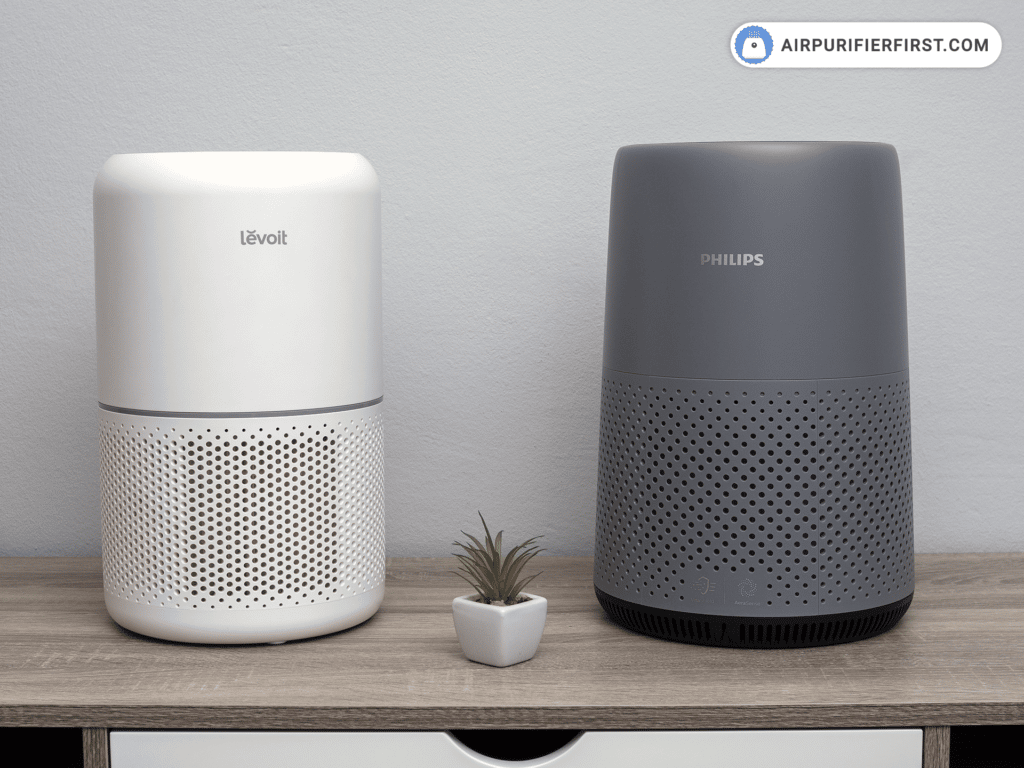
On the other hand, Levoit Core 300 needs a filter replacement between 6-8 months, and you might need help remembering the exact date to replace the filters.
Airflow
Another common feature both Philips and Levoit air purifiers share is airflow. Air inlets are located on the bottom part, the air circulates through filters and later on gets dispersed into every corner of the room through the holes on the upper side of the device.
Warranty
Both manufacturers provide warranty coverage for their products. Philips Series 800 air purifier is covered with a 2-year warranty, and you can use it worldwide after you register.
As far as the Levoit Core 300 air purifier, you get 1-year warranty coverage, with an additional year if you register on Levoit’s website two weeks after the purchase. So it’s basically a 2-year warranty.
Filtration Technology
As much as these air purifiers seem alike and share a three-stage filtration, each of them is quite unique.
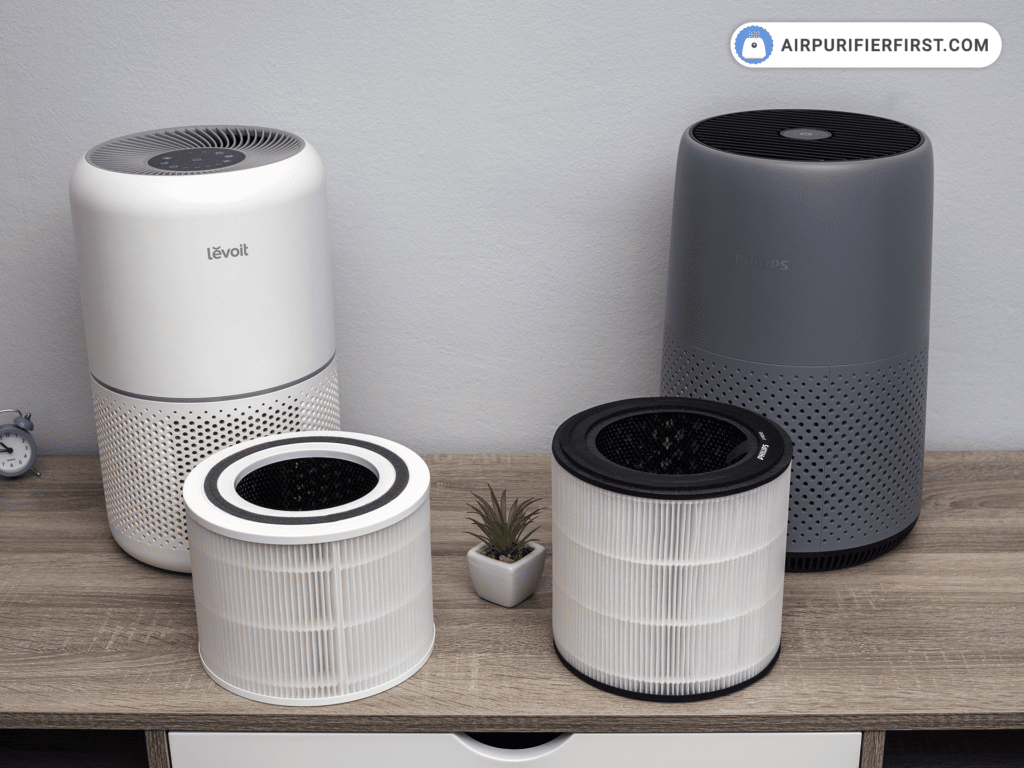
The Philips air purifier has a Pre-filter, NanoProtect HEPA filter, and an Activated Carbon filter. As usual, a pre-filter is used to hold all the great particles, while a carbon filter controls the odors and unpleasant smells. The NanoProtect HEPA filter is good at trapping dust particles, pollen, allergens, etc. Even though it is not as good as the True HEPA filter, it can still make a drastic change in your air quality.
The Levoit Core 300 is a specific air purifier, in a way. By default, it comes with the original filter, which is consisted of a pre-filter, a True HEPA filter, and an Activated Carbon filter. In addition, you can buy extra filters, depending on your needs. If you have pets or you work surrounded by harsh chemicals or even mold, then you have multiple choices within filters available for this air purifier.
You can find more details on each filter in a detailed review.
How to Replace Filters on Both These Devices?
Probably the most important fact you need to know is that none of the filters in both Philips and Levoit is that filters are not washable. Don’t even try.
Instead, follow the Filter Reset Indicators installed, and you’ll be notified in due time.
As mentioned in one of the previous sections, Philips Series 800 has filters that can last up to a year, while Levoit Core 300 filters last for two-three quarters of the year.
No matter how long it takes before your air purifier’s filters need a replacement, I recommend you clean them occasionally.
More details can be found in separate reviews.
Noise Tests
When testing the noise levels, I never know what to expect. This situation is no exception.
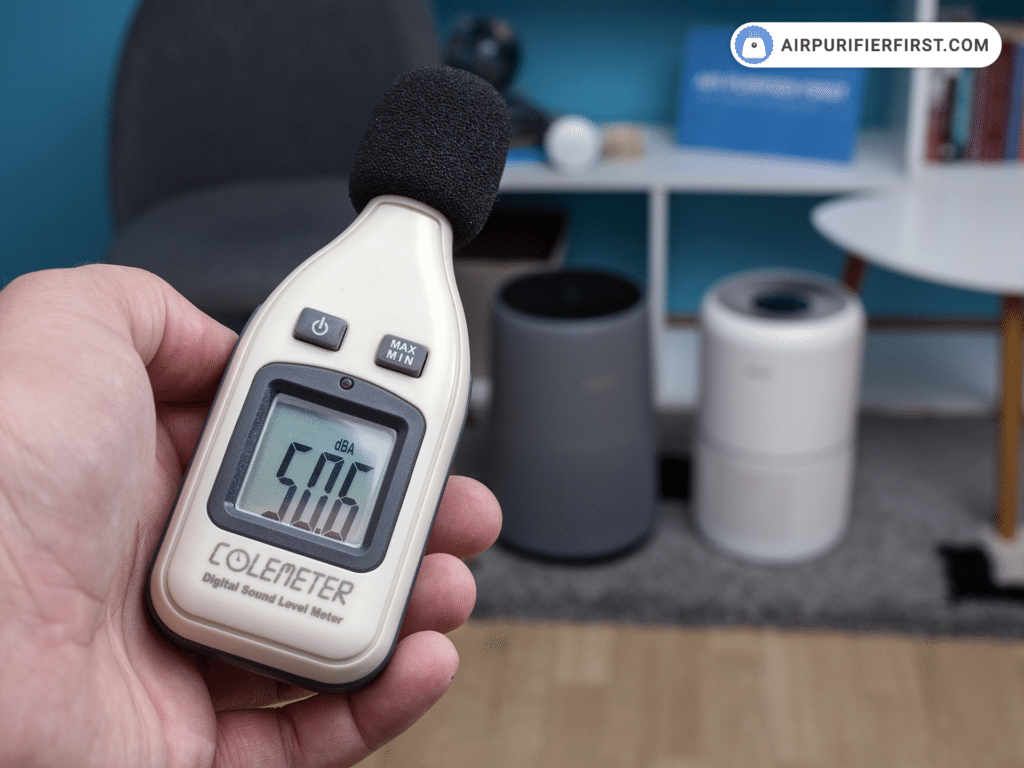
On one side is the Levoit air purifier with three fan speeds, plus the additional sleep mode. On the other side is a Philips air purifier with its unique sleep, auto, and turbo fan speeds. Different fan speeds showed different results.
While running in sleep mode, both air purifiers had impressive results. This means both can be left running in the bedroom during the night’s sleep. Levoit was even quieter than Philips.
| Product | Noise Range (dBA) |
|---|---|
| Philips Series 800 | 41.8 – 62.8 dBA |
| Levoit Core 300 | 40.7 – 64.9 dBA |
However, the faster the air purifiers worked, the louder they became. Even though you get the most airflow out of an air purifier while on top speed, I am still under the impression of a fair loudness.
Performance Tests
There are a lot of factors that can affect the overall performance of an air purifier. With these two air purifiers, everything is about contrast. Even though it is smaller, Levoit is heavier than Philips yet, can cover up to 219 sq. ft. room size. On the other side, as a larger device, Philips has less room coverage, i.e. 176 sq. ft.
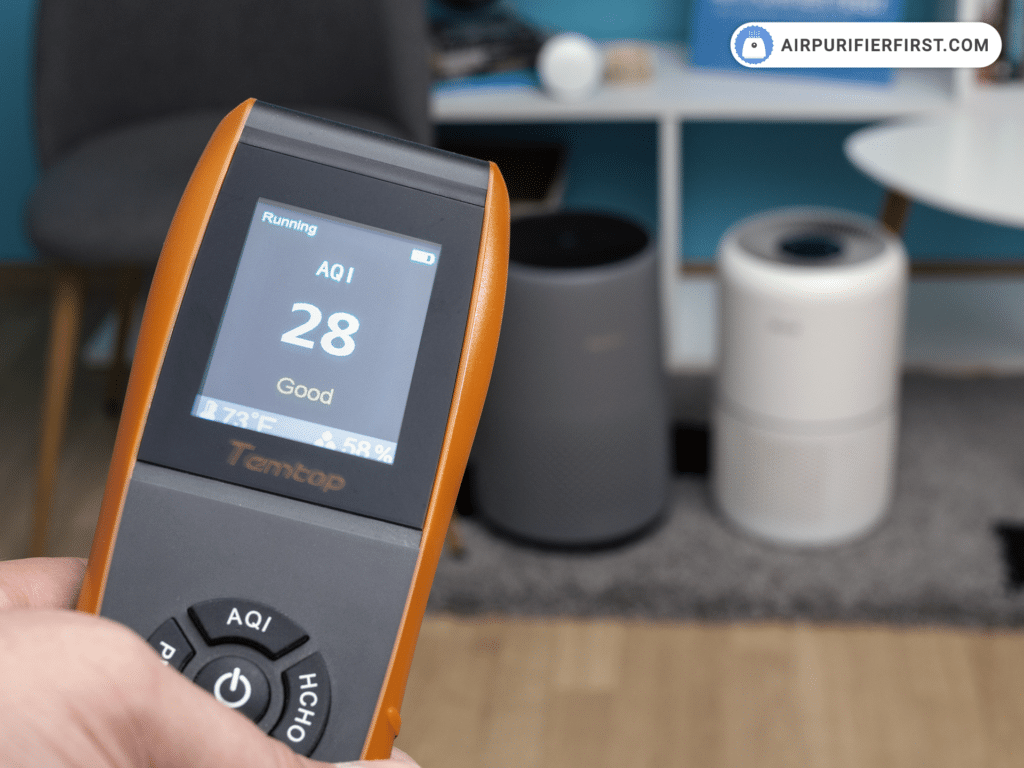
I am about to show you the results of two separate tests, where I’ve left these air purifiers running at top speed for an hour.
194 sq. ft. Room Tests
Amazing results have been shown by both Philips Series 800 and Levoit Core 300 air purifiers. By amazing I am referring to a 93% air quality improvement. This result was expected from Levoit, but Philips did stand out.
194 sq. ft. Room
* Data measuring time is 60 minutes.
320 sq. ft. Room Tests
As for this test, I was overwhelmed by both devices, given the fact that the room size exceeded each air purifier’s coverage limit. Philips Series 800 managed to deliver 91% cleaner air, while Levoit Core 300 raised the bar by one percentage point.
320 sq. ft. Room
* Data measuring time is 60 minutes.
Operating Costs
If Levoit Core 300 is Energy Star certified, meaning it saves energy with its 45W motor, what would you say about the Philips Series 800 air purifier that has only 20W to use? From this point of view, both air purifiers are energy-friendly devices.
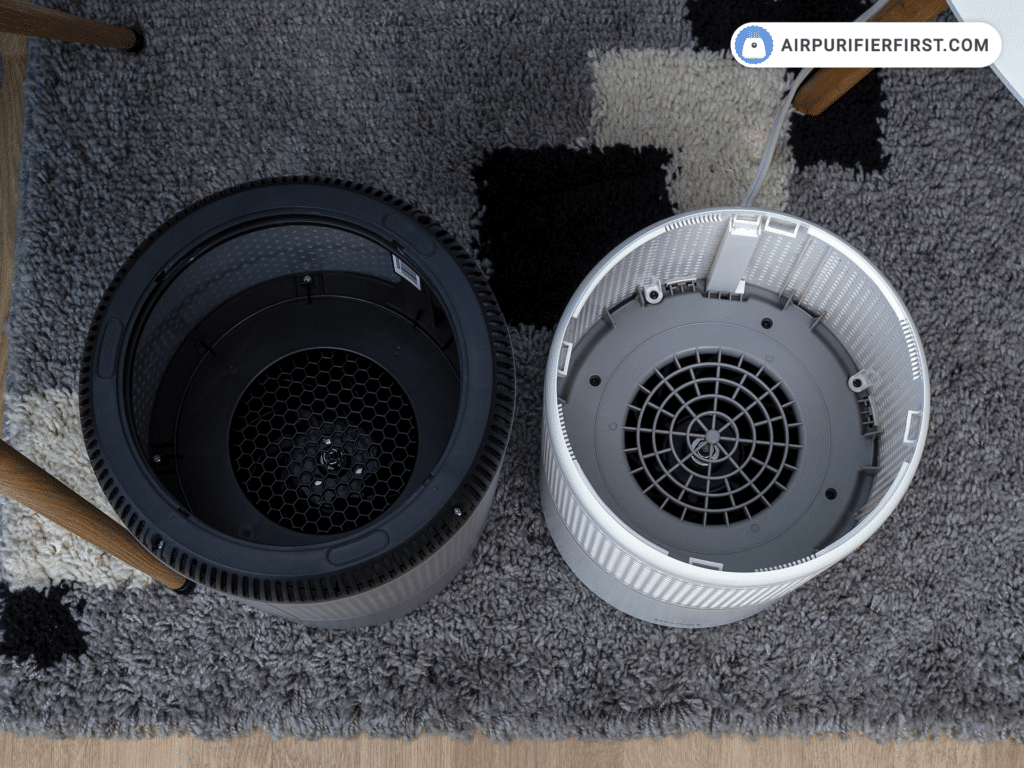
Let’s say you leave each one of these running for a whole month, 24/7, while on top or turbo speed level. By the end of the month, you will end up with a significant difference you will actually need to pay. A 1.60$ Philips electricity bill is nothing compared to the 3.80$ you will need to pay to keep Levoit on the go. But even so, this seems like a tied result, considering each motor’s power.
| Product | Wattage Range (W) |
|---|---|
| Philips Series 800 | 2.2 – 17.5W |
| Levoit Core 300 | 0.8 – 43.5W |
Philips Series 800 Vs Levoit Core 300 Video Comparison
Which One Does it Better?
I must admit I had a real deal with these two air purifiers, trying to find some real and significant differences. All the tests I conducted had me declaring a draw situation. The reason is that these are two top-in-class devices with excellent performance and low operating costs, being affordable at the same time.
As the Philips Series 800 turned out to be more affordable and quieter, thanks to its advanced options, I decided to declare it the winner of this comparison. Levoit Core 300S is a perfect air purifier, but I think Philips can offer much more.
If you fancy Levoit, a model that can compete with Philips and which is perhaps even a better choice for purchase would be the improved Levoit Core 300S.
If you have any questions regarding these two devices, please leave a comment in the comment box below.
Just to mention for European buyers :
If you live in the EU, a Philips replacement filter is a lot easier to find in fysic stores and online shops compared to a Levoit.
The reason is probably because Philips is originally a Dutch manufacturer, and therefore more focused on the European market.